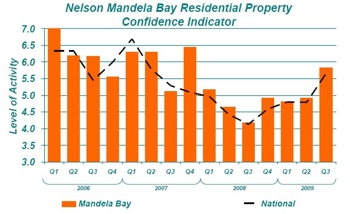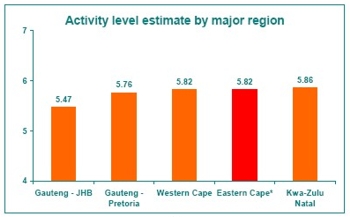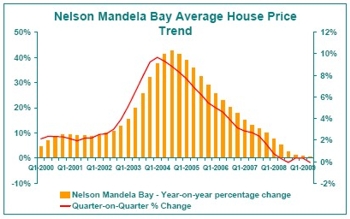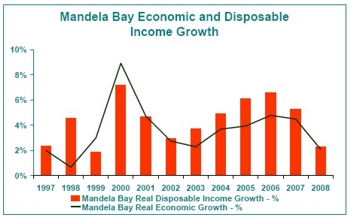 The 3rd Quarter Nelson Mandela Bay Metro FNB Residential Property Barometer pointed to a significant jump in activity levels in the region, after a mediocre improvement since the low point reached in the 3rd quarter a year ago. This suggests that the region is beginning to feel the positive impact of the series of interest rate cuts that took place in the 1st half of 2009. The Property Barometer is a survey of a sample of estate agents in the major cities of the country regarding their personal experience of market conditions. The main Barometer question relates to the level of demand activity, and agents are asked to rate the level of demand that they experience on a scale of 1 to 10.
The 3rd Quarter Nelson Mandela Bay Metro FNB Residential Property Barometer pointed to a significant jump in activity levels in the region, after a mediocre improvement since the low point reached in the 3rd quarter a year ago. This suggests that the region is beginning to feel the positive impact of the series of interest rate cuts that took place in the 1st half of 2009. The Property Barometer is a survey of a sample of estate agents in the major cities of the country regarding their personal experience of market conditions. The main Barometer question relates to the level of demand activity, and agents are asked to rate the level of demand that they experience on a scale of 1 to 10.  After an initial rise from 4.18 in the 3rd quarter a year ago to 4.92 in the 2nd quarter of 2009, agents estimated activity to have jumped more significantly to 5.82 in the 3rd quarter. The 3rd quarter survey was undertaken in mid-August, after the bulk of the SARB’s 2009 interest rate cuts to date.
After an initial rise from 4.18 in the 3rd quarter a year ago to 4.92 in the 2nd quarter of 2009, agents estimated activity to have jumped more significantly to 5.82 in the 3rd quarter. The 3rd quarter survey was undertaken in mid-August, after the bulk of the SARB’s 2009 interest rate cuts to date.
Mandela Bay Metro survey respondents are slightly more optimistic than their inland counterparts  The jump in the Mandela Bay activity rating means that the agents surveyed from the region, as in the other major coastal regions, are more upbeat about activity than their Gauteng counterparts, although all regions have seen an improvement. The 3 major coastal metros, namely eThekwini (5.86), Mandela Bay (5.82), and Cape Town (5.82) are now more upbeat in their estimates of activity compared with Joburg’s 5.47 and Tshwane (5.76). Greater seller realism may be setting in On a 2 quarter moving average basis, the estimated percentage of properties sold at below asking price showed a further decline from 79% in the 2nd quarter to 75% in the 3rd quarter, while the average time of a property on the market prior to being sold declined only marginally from 16 weeks and 6 days in the 2nd quarter to 16 weeks and 3 days in the 3rd. These two indicators, when read together, point towards more realistic pricing by sellers, most notably the general decline in those properties sold at below asking price since the 94% of the 3rd quarter of 2003. The greater realism may not only be due to sellers setting prices lower, but also due to the market catching up to price levels, therefore making previously unrealistic price levels now a little more realistic in a stronger market.
The jump in the Mandela Bay activity rating means that the agents surveyed from the region, as in the other major coastal regions, are more upbeat about activity than their Gauteng counterparts, although all regions have seen an improvement. The 3 major coastal metros, namely eThekwini (5.86), Mandela Bay (5.82), and Cape Town (5.82) are now more upbeat in their estimates of activity compared with Joburg’s 5.47 and Tshwane (5.76). Greater seller realism may be setting in On a 2 quarter moving average basis, the estimated percentage of properties sold at below asking price showed a further decline from 79% in the 2nd quarter to 75% in the 3rd quarter, while the average time of a property on the market prior to being sold declined only marginally from 16 weeks and 6 days in the 2nd quarter to 16 weeks and 3 days in the 3rd. These two indicators, when read together, point towards more realistic pricing by sellers, most notably the general decline in those properties sold at below asking price since the 94% of the 3rd quarter of 2003. The greater realism may not only be due to sellers setting prices lower, but also due to the market catching up to price levels, therefore making previously unrealistic price levels now a little more realistic in a stronger market.

Reasons for selling property in Mandela Bay

Selling in order to downscale due to financial pressure remained high although fairly stable, slightly higher at 26% of total selling in the 3rd quarter from 25% in the 2nd quarter of 2009 (on a 2-quarter moving average basis). Simultaneously, selling in order to upgrade showed a marginal improvement from 4% to 6% from quarter to quarter, which remains low in comparison to levels near to 16% as at the beginning of 2008. Thus, although the demand side of the market has strengthened, it is clear that the household sector in Port Elizabeth remains under pressure for the time being. As a percentage of total selling, emigration selling in Port Elizabeth showed a surge during 2008, similar to the trend in other metros, but never reached as high a level as the likes of the Gauteng metros or eThekwini. After a peak of 14% in the 4th quarter of 2008, there has been a broad decline in emigration selling’s significance to only 7% of total selling by the 3rd quarter of this year, according to the estate agents surveyed.

Mandela Bay remains teetering on the brink of average price deflation (using Deeds data), although things appear to be levelling out.  On a year-on-year basis, the Nelson Mandela Bay Metro clung on to slight house price inflation of 0.5%. However, on a quarter-on-quarter basis the rate returned to deflation of -0.1%, indicating that as at the second quarter the momentum in prices had not yet turned upward. Interpretation/Conclusion Although not expected to be a strong recovery, the 3rd quarter Barometer points to significantly stronger situation in the Nelson Mandela Bay residential market, following a period in which demand activity battled to improve. The 3rd quarter jump in demand was significant, while another key indicator, that being the percentage of sellers achieving their asking price, has also improved significantly. Deeds data runs a bit behind, but while area slight price deflation on month-on-month basis was still apparent in the 2nd quarter, it is believed that this will turn for the better in the coming quarters’ data, once demand catches up with the apparent oversupply of recent times. To date, the demand improvement is largely the result of interest rate cuts, and banks’ response to better market conditions by relaxing lending criteria has reinforced the trend. In the near term, though, the economy is expected to provide more support for the market as we emerge from recession.
On a year-on-year basis, the Nelson Mandela Bay Metro clung on to slight house price inflation of 0.5%. However, on a quarter-on-quarter basis the rate returned to deflation of -0.1%, indicating that as at the second quarter the momentum in prices had not yet turned upward. Interpretation/Conclusion Although not expected to be a strong recovery, the 3rd quarter Barometer points to significantly stronger situation in the Nelson Mandela Bay residential market, following a period in which demand activity battled to improve. The 3rd quarter jump in demand was significant, while another key indicator, that being the percentage of sellers achieving their asking price, has also improved significantly. Deeds data runs a bit behind, but while area slight price deflation on month-on-month basis was still apparent in the 2nd quarter, it is believed that this will turn for the better in the coming quarters’ data, once demand catches up with the apparent oversupply of recent times. To date, the demand improvement is largely the result of interest rate cuts, and banks’ response to better market conditions by relaxing lending criteria has reinforced the trend. In the near term, though, the economy is expected to provide more support for the market as we emerge from recession.  In 2008, the Mandela Bay real economic growth rate was believed to have slumped from 4.5% in 2007 to 2.1%, exerting huge pressure on real disposable income growth, which slowed from 5.3% in 2007 to 2.3% last year. In all likelihood Mandela Bay has been in a recession during the first half of 2009, but the signs are that both the global economy and our own national economy are beginning to strengthen, good news for what can be a very cyclical Mandela Bay economy and property market.
In 2008, the Mandela Bay real economic growth rate was believed to have slumped from 4.5% in 2007 to 2.1%, exerting huge pressure on real disposable income growth, which slowed from 5.3% in 2007 to 2.3% last year. In all likelihood Mandela Bay has been in a recession during the first half of 2009, but the signs are that both the global economy and our own national economy are beginning to strengthen, good news for what can be a very cyclical Mandela Bay economy and property market.



